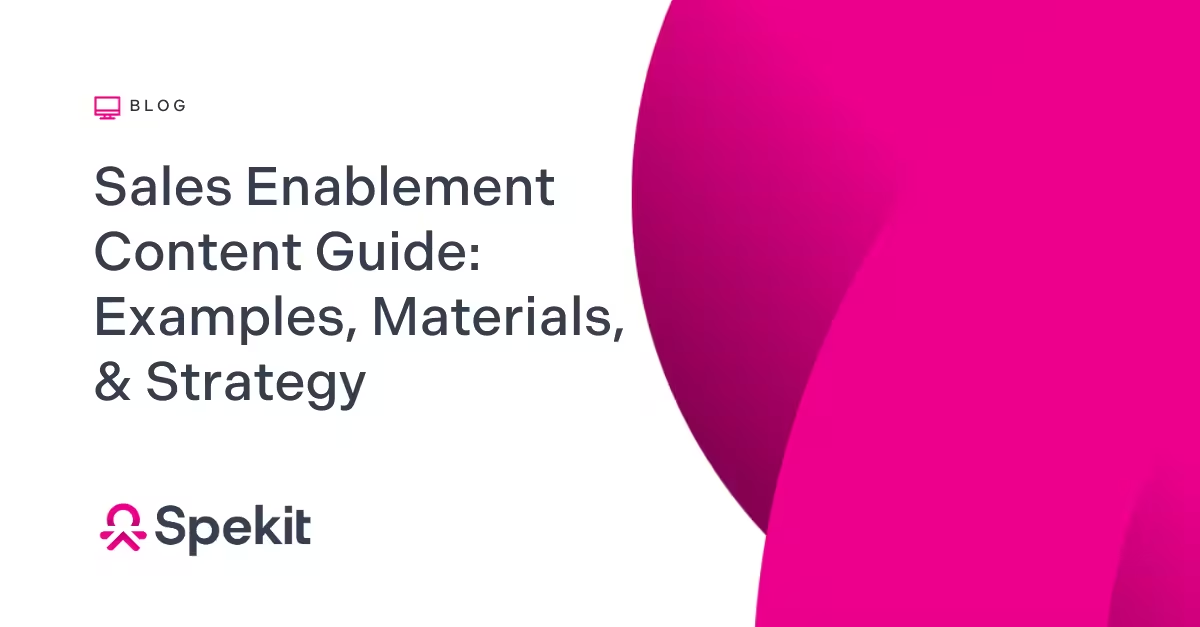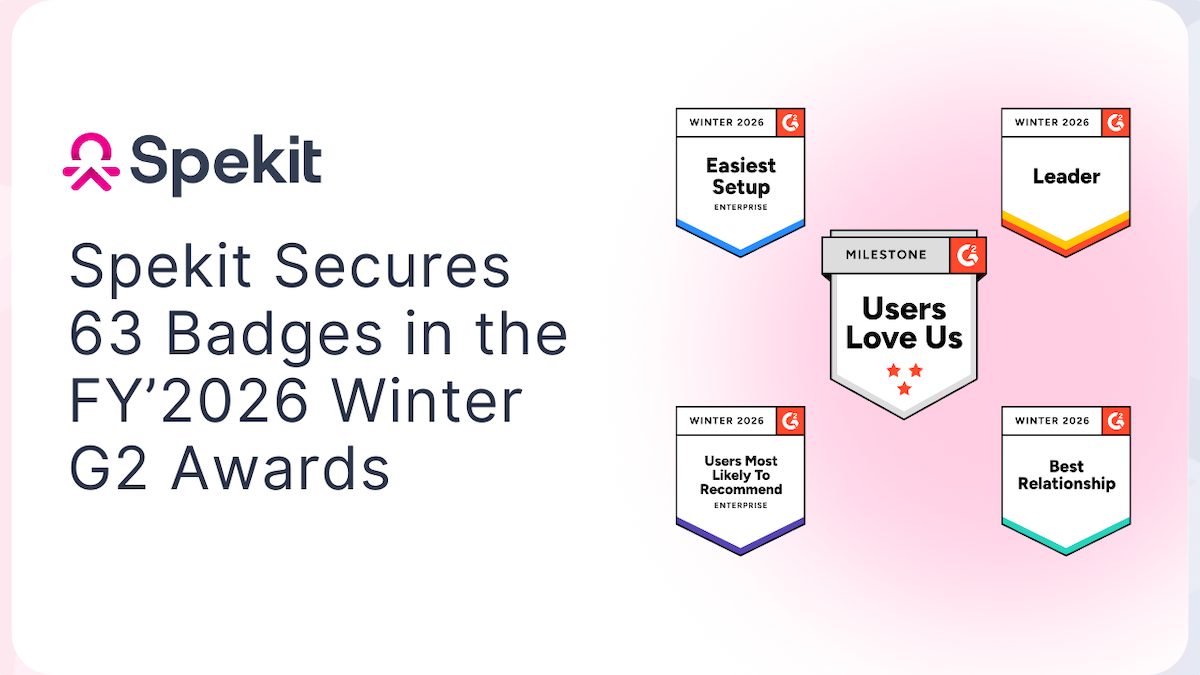Low win rates got you (and your revenue projections) down?
The source of your woes could be a lack of proper sales enablement content. In this guide we’re showing you what it takes to create, manage, and measure the impact of sales enablement content that sells.
We'll also take you through some our favorite types and examples, and how innovative sales enablement tech is transforming how enablement content is used by reps.
What is sales enablement content?
Sales enablement content are the resources a sales team uses to sell more effectively. It equips reps with the knowledge they need to communicate a product’s value and speak directly to the pain points of buyers.
Why is this important?
Because content moves pipeline and wins sales.
81% of buyers say that a brand’s content significantly impacted their buying decision.
What’s more, 67% of buyers said a winning vendor “demonstrated a stronger knowledge of their company and needs.”
Beyond those stats, sales enablement content can:
- Reduce ramp time: Long ramp times affect sales productivity. New reps become more productive when they have access to the right resources.
- Coordinate messaging: Inconsistent or unclear messaging can crater sales and confuse rather than convince prospects. Sales enablement content helps reps deliver consistent messaging.
- Improve sales efficiency: Reps spend more time actively selling because they’re not wasting time searching for materials.
To recap: Sales enablement content gives reps the right words to represent the brand and product, answers to counter common objections, and proof points to convince their prospective buyer that this solution will work for them.
What is the difference between sales support and sales enablement?
The difference between sales support and sales enablement is simple: enablement builds a rep’s ability to sell, while sales support handles the tasks that let them focus on selling.
On average, sales reps only spend 30% of their time selling. The rest of their time is spent conducting research, scheduling meetings, and creating presentations.
Sales support teams and tools aim to remove non-selling tasks off a reps to-do list, freeing them to spend more time building relationships and closing deals.
Given that description, sales enablement might seem like support. After all, a sales enablement team or function does create resources the sales team might otherwise create for themselves. But enablement is about improving the sales process through resource creation, not reducing tasks.
Regardless of their differences, both are necessary to boost revenue.
The four pillars of sales enablement
Sales enablement is held up by four pillars: training and onboarding, content and messaging, coaching and reinforcement, and tools and insights. These are areas that any sales enablement team will be responsible for providing.
Let’s take a look at each and explain how Spekit as a sales enablement platform supports them.
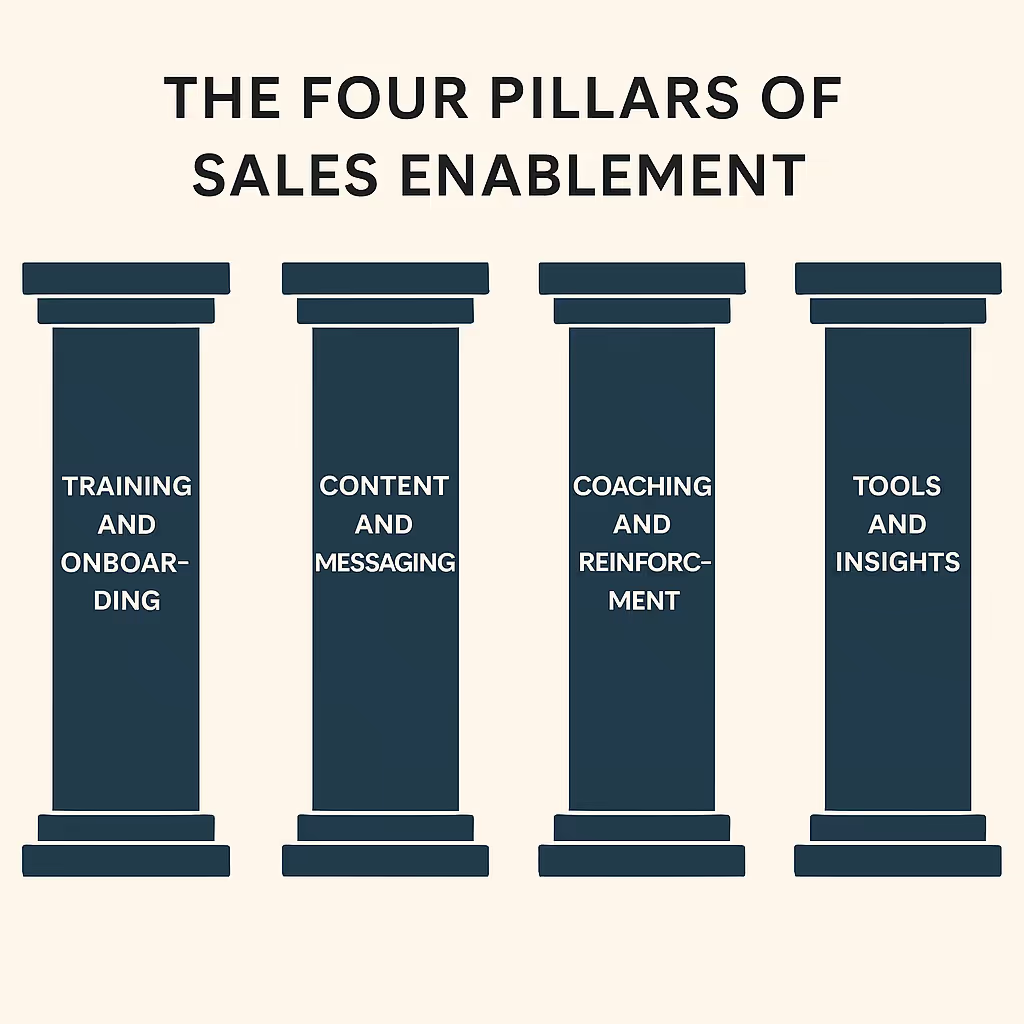
Training and onboarding
This pillar focuses on building sales skills through onboarding, ongoing training, and real-time coaching. It’s about ensuring reps know how to sell this exact product or offering effectively, from discovery calls to closing techniques.
On average it takes 3 months for reps to gain product knowledge and learn internal processes before they ramp up to full productivity.
But organizations can reduce ramp time with the right enablement in place.
With sales enablement software like Spekit, you can create “digestible” training lessons that fit into the sales tools reps use. This helps address the shortcomings of traditional sales training that often lack engagement and real-world application.
Read more: Learn how Introhive reduced onboarding time by 75%.
Content and messaging
This pillar ensures reps have access to up-to-date collateral and know how to use it in conversations. It includes:
- Product knowledge guides
- Product launch content
- Feature documentation
- Sales playbooks
- Battle cards
- Case studies
Keep in mind that sales enablement content simply existing isn’t enough to boost sales success. Reps spend approximately 3 to 11 hours a week hunting for answers to questions about tools, processes, and product information. So making those resources accessible is just as important.
Spekit simplifies content management and enables you to create a “single source of truth” for all your resources. With everything in one place, reps can surface the answers they need—battle cards, playbooks, and messaging—and eliminate the context switching that often kills sales productivity.
When messaging changes (as it inevitably does), Spekit instantly updates it everywhere. No need to spend hours manually updating sales decks and playbooks. Reps have the latest messaging at their fingertips, when and where they need it, without having to leave their workflows.
Coaching and reinforcement
The coaching and reinforcement pillar provides personalized guidance and feedback to improve sales rep performance. This is done through:
- One-on-one coaching sessions
- Call reviews
- Role-playing exercises
Coaching is key to close skill gaps and reinforce best practices. However, there’s a wide disconnect between what managers think they provide and what reps receive.
Just 19% of reps highly rate the coaching they receive, while 70% of leaders are confident about their approach. Part of the disparity is due to a lack of practical guidance. 29% of reps say the coaching they receive lacks actionable advice.
Spekit makes sales coaching more effective.
It delivers key coaching points right into your reps’ workflow where they can immediately apply what they’ve learned. This approach is more effective than traditional coaching, as it replaces static training with real-time learning and reinforcement.
Read more: How to Optimize Your Sales Coaching Process
Tools and insights
A lot that goes on behind each sale, from researching prospects to booking meetings and creating proposals. Fortunately, there are tools designed to improve productivity, shorten sales cycles, and provide valuable insights.
These include:
- Customer relationship management (CRM) software
- Content management systems
- Knowledge management software
- Sales enablement platforms
- Analytics tools
The best sales tools can surface the exact playbooks and scripts that reps need to move pipeline forward. For example, Spekit—a sales enablement and knowledge management platform—can analyze a sales email and suggest content reps can use based on where prospects are in the sales lifecycle.
Sales enablement content types with examples
There are two types of sales enablement content: internal and external.
Internal sales enablement content
Internal sales enablement content stays within your organization. This type of content is created to help reps sell better.
Here are some examples
Onboarding materials
Onboarding materials for sales enablement include:
- Company overview decks
- Product knowledge guides
- Buyer personas
- Sales methodology frameworks
- Call listening and coaching
- Demo scrips
- Proposal templates
- Call recording library
- Sales playbooks
Here’s an example of a company overview deck from Sastrify:
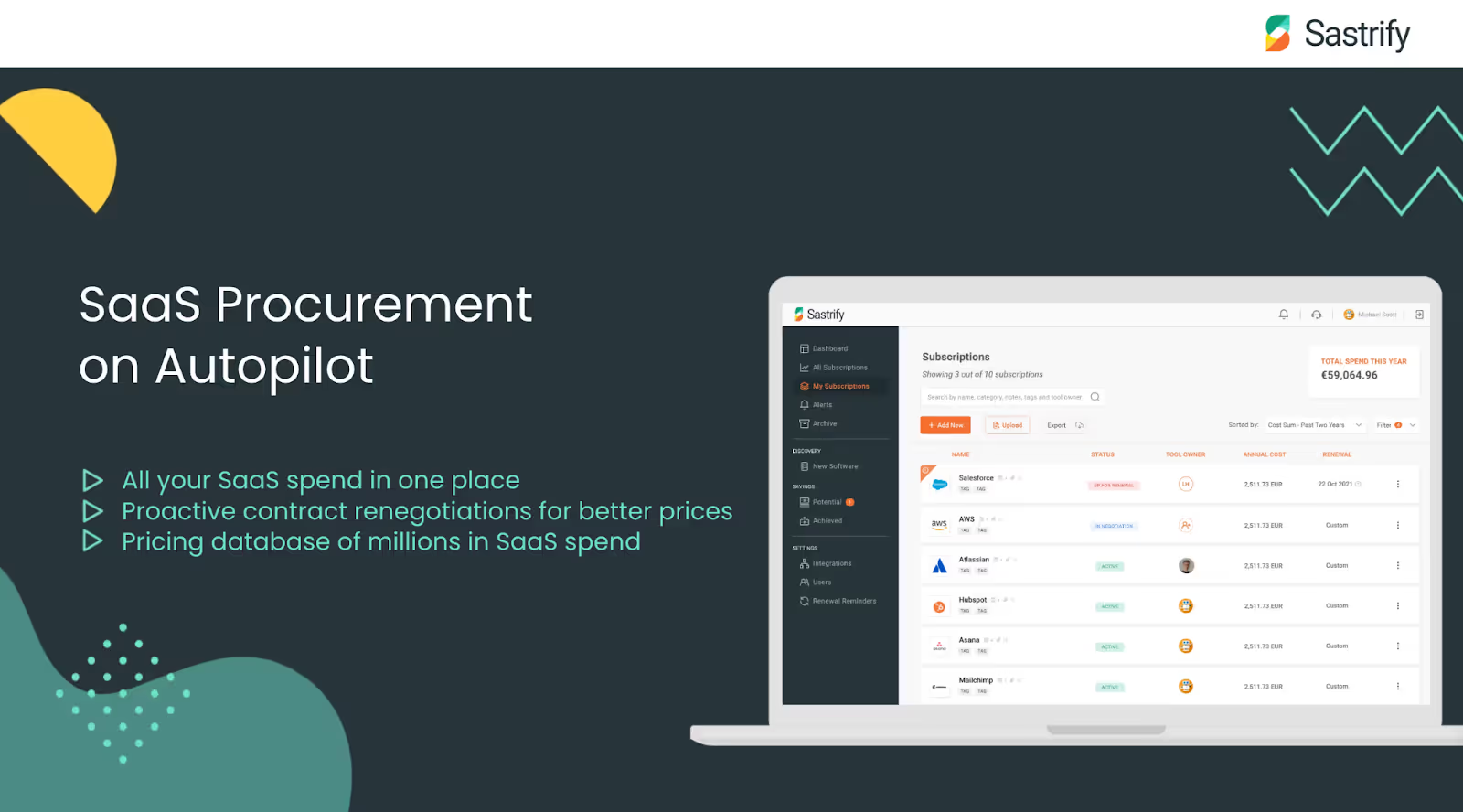
Pro tip: Don’t overwhelm new hires with onboarding materials. Instead, use a just-in-time learning platform to provide reps with “bite-sized” content when and where they need it.
Read more: What is Sales Onboarding? Guide and Best Practices
Sales playbooks
Sales playbooks are resources that contain the processes and strategies reps will use to close deals. They help reps navigate the sales process and outline what they should do in specific selling situations. An example is a “play” that tells sales teams what messaging to use when speaking with a CFO versus a CTO.
Sales playbooks include:
- Company and product information
- Customer personas
- Sales scripts and talk tracks
- Objection handling scripts
- Sales methodology and processes
Pro tip: You don’t have to start with a blank page. With Spekit, you can instantly create sales playbooks using a variety of sales templates and make them available to reps on demand.
Battlecards
Sales battle cards are generally one-page documents that provide sales teams with key talking points to navigate different sales situations. It’s all the information they need to do battle with and none of what will bog them down as they combat common objections, competitive pressure, and moments of hesitation in the sales cycle.
Common types of battle cards include:
- Product and feature-focused battle cards: If your company has multiple products, creating battle cards for each can provide reps with talking points for each.
- Competitor battle cards: These cards contain information about competitors, such as their product features, pricing, and positioning, and how to differentiate your offer.
- Objection handling battle cards: Objections are a natural part of the sales process. These cards help reps handle common objections.
Here’s an example of a battle card from Pipe17:
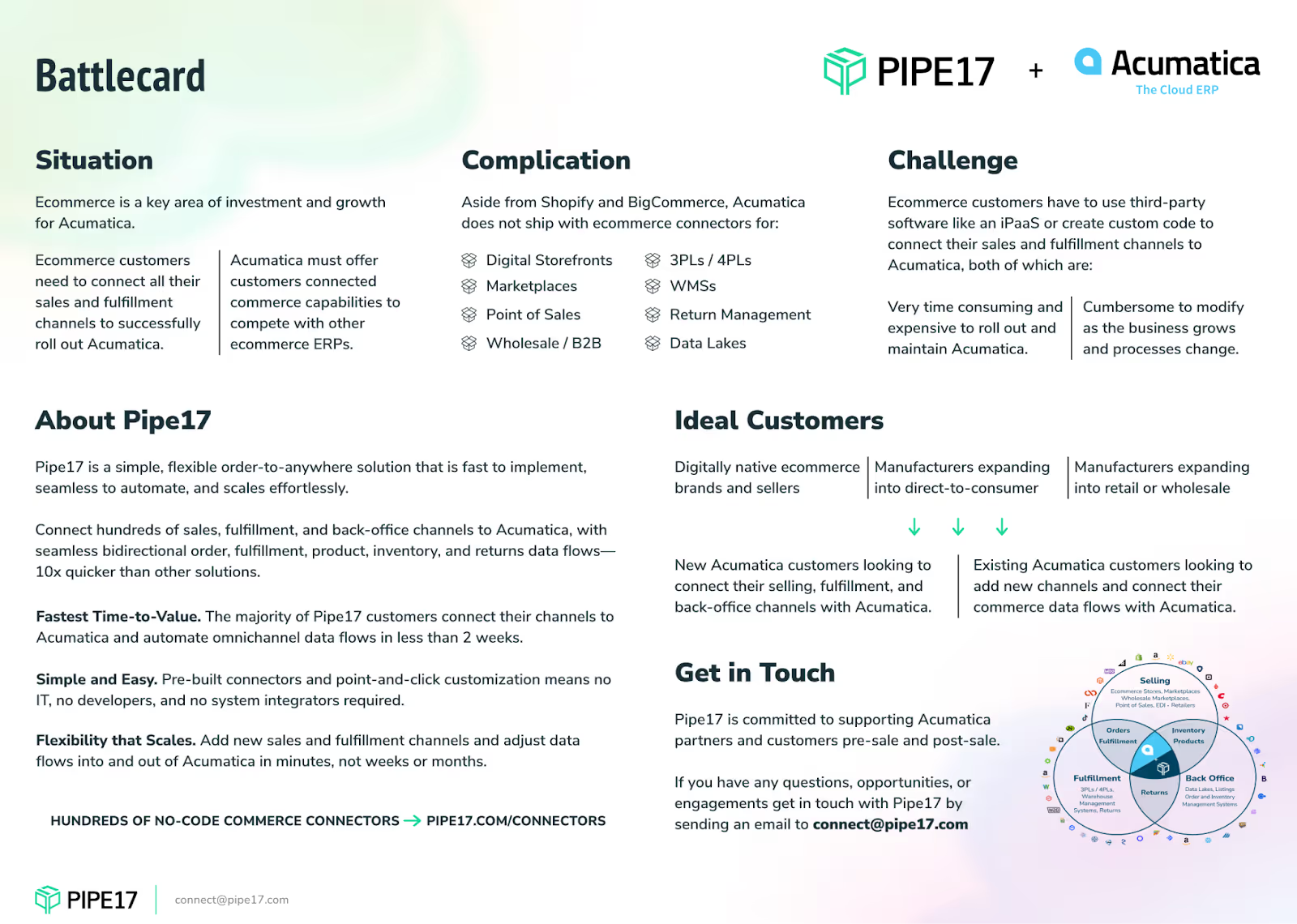
Pro tip: Keep battle cards accessible to facilitate quick reference. With Spekit, reps can automatically surface contextually relevant battle cards when needed.
External sales enablement content
Sales and marketing typically create external sales enablement content to help reps sell more confidently and help prospects make informed purchasing decisions.
Here are some examples.
Product spec sheets
Product spec sheets are concise, one or two-page documents that include:
- Product specifications and features
- Available configurations and customization options
- Performance metrics and benchmark data
- Functional requirements
- Regulatory and compliance information
They may also include who the product is for, how it solves their problems, and how much it costs to help them determine if it fits their needs.
Pro tip: Create separate spec sheets for different products and make them easily accessible to your reps, so they can share these resources during the sales process.
Case studies
Case studies are an effective type of sales enablement content because they act as a form of social proof—if others have solved a problem with your solution, so can they.
Here’s an example of a case study that showcases how ZoomInfo used Spekit to book more calls and add millions of dollars in pipeline:
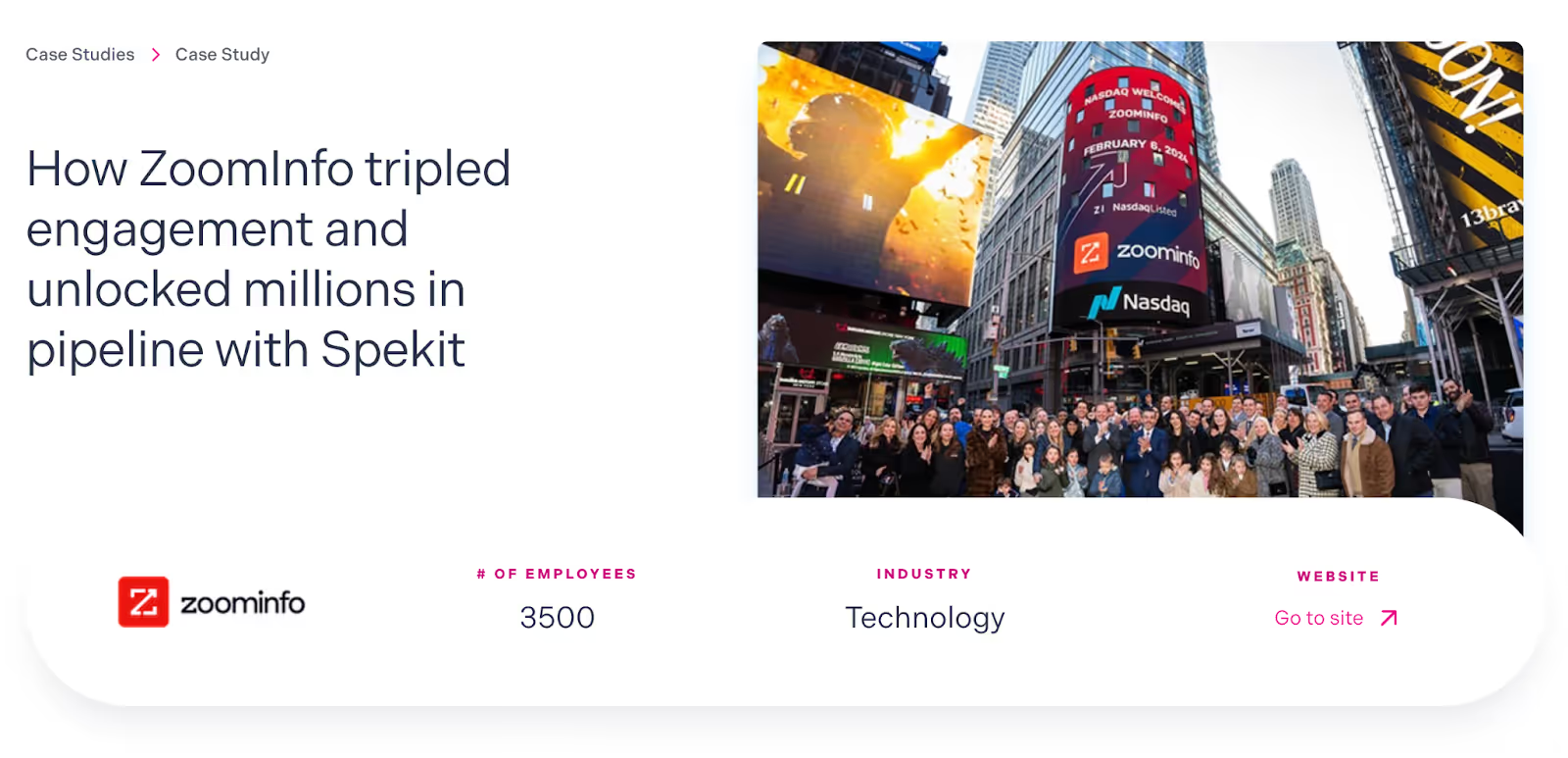
Pro tip: Track engagement rates with shared case studies to identify which success stories resonate with your prospects.
Sales decks
Sales decks are slide presentations that often accompany a sales pitch or demo. They allow reps to visually communicate value propositions and showcase product features.
Sales decks include:
- Company introduction
- Problem statement that articulates pain points
- Solution overview of how your product addresses a pain point
- Customer testimonials from notable clients
- General pricing structure
- Next steps with a clear call to action
Here’s an example of a sales deck from Cello:
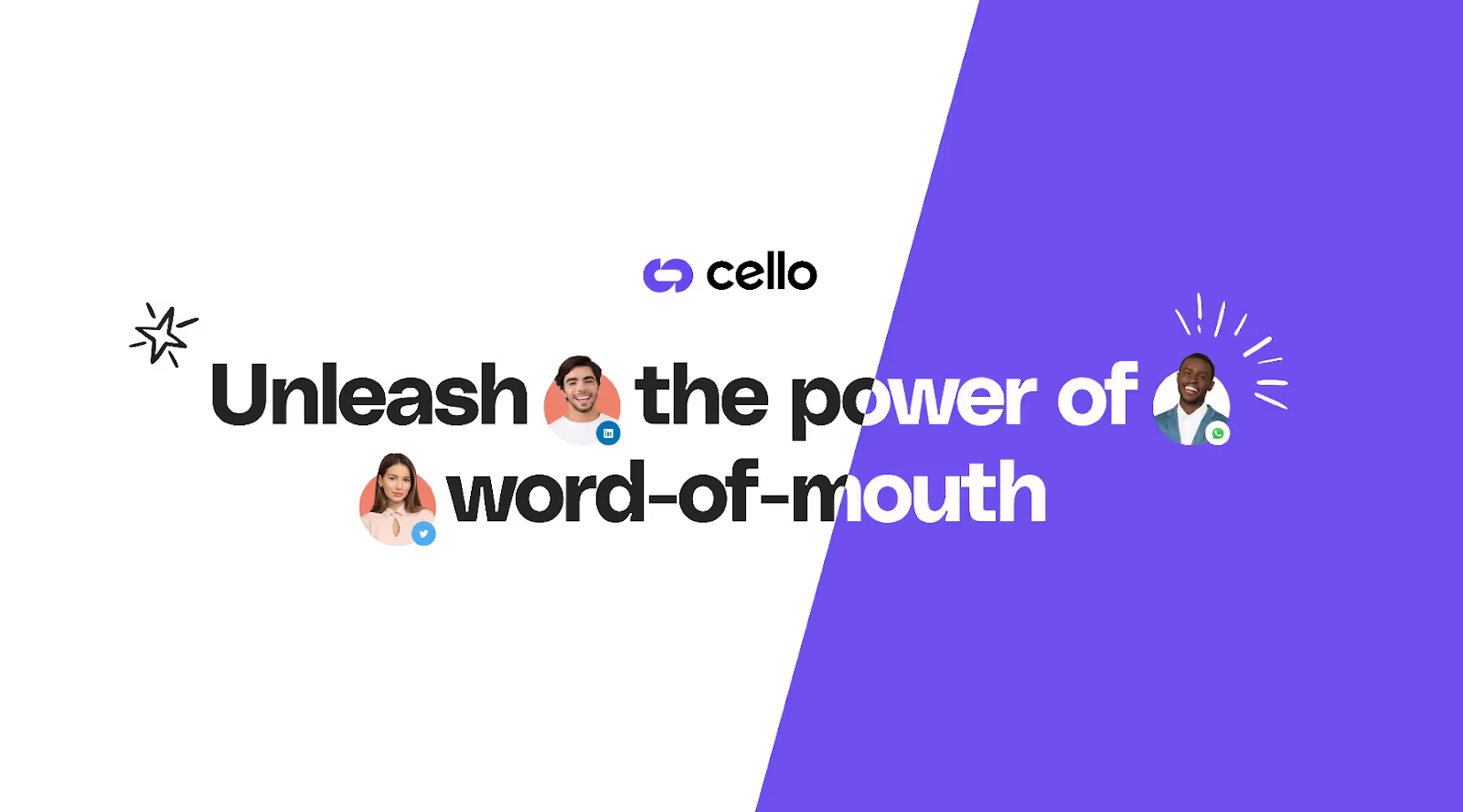
Pro tip: Don’t be afraid to leverage AI to help with content creation. Spekit offers powerful AI tools that let you create personalized decks in minutes for different companies or personas with a single prompt.
What is a sales enablement strategy?
A sales enablement strategy is how you determine what resources get created, how you create them, and how you measure their impact.
Without one, teams end up creating content without understanding if it's really what their sales team needs to close more deals. Enablement becomes a rushed, reactive activity responding to sales requests rather than a proactive plan to meet reps where they are with the words and assets that convince buyers.
Your sales enablement strategy should have:
- Goals and KPIs – Define what success looks like and how you’ll measure it.
- Content plan – Identify the messaging, collateral, and resources reps need at each stage of the buyer journey.
- Training approach – Outline how you’ll onboard new hires and reinforce skills over time.
- Technology and tools – Select platforms that make resources easy to access in the flow of work.
- Feedback loop – Create a process for gathering rep feedback and refining your enablement efforts.
The good news is that sales recognizes that value of enablement:
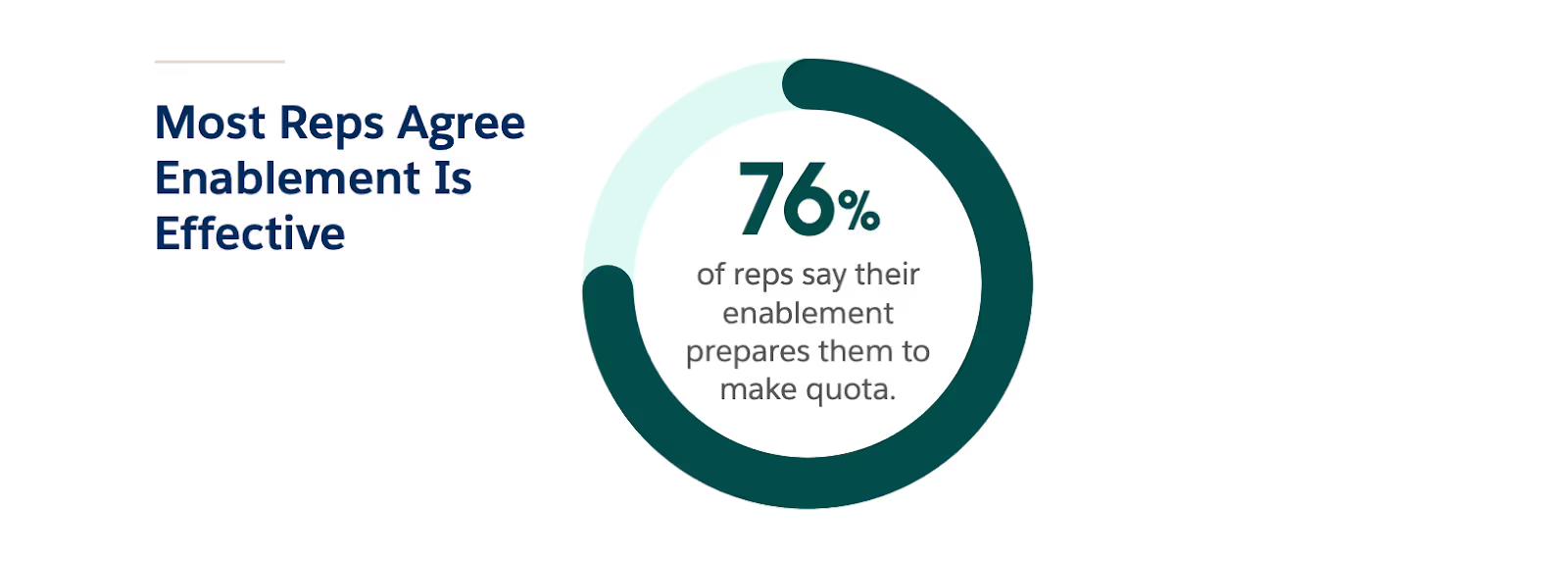
A good strategy ensures your effort goes toward the assets sales feel help then sell and not the ones that get lost in a forgotten folder in your Google drive.
How to create your own sales enablement strategy
If you want to create a sales enablement strategy from scratch, you’ll need to:
- Create a sales enablement charter
- Audit existing content
- Align enablement content to the buyer’s journey
- Enable just-in-time learning
- Track enablement metrics
Let’s look at each step in greater detail so that you can action it on your own.
1. Create a sales enablement charter
Sales enablement strategy needs a charter—a “road map” that guides and directs enablement efforts. It outlines the following:
- Mission statement: What are the objectives of the sales enablement function?
- Goals and KPIs: How will you measure sales enablement success?
- Primary stakeholders: Who’s involved in planning and executing the strategy?
- Tools: What tools will be used to manage and surface enablement content?
- Scope: What falls within the scope of the sales enablement function?
- Governance: Who has final say on different aspects of the enablement program?
Creating an enablement charter is a valuable step that often gets overlooked. Just 38% of sales enablement professionals say they have one, meaning many companies operate without one.
2. Audit existing content
Chances are your company already has a collection of sales materials—sales scripts, battle cards, etc. But these resources can quickly become outdated.
Almost half of sales enablement professionals (48.8%) say that 40-100% of their content needs a refresh. This indicates that reps are working with outdated information.
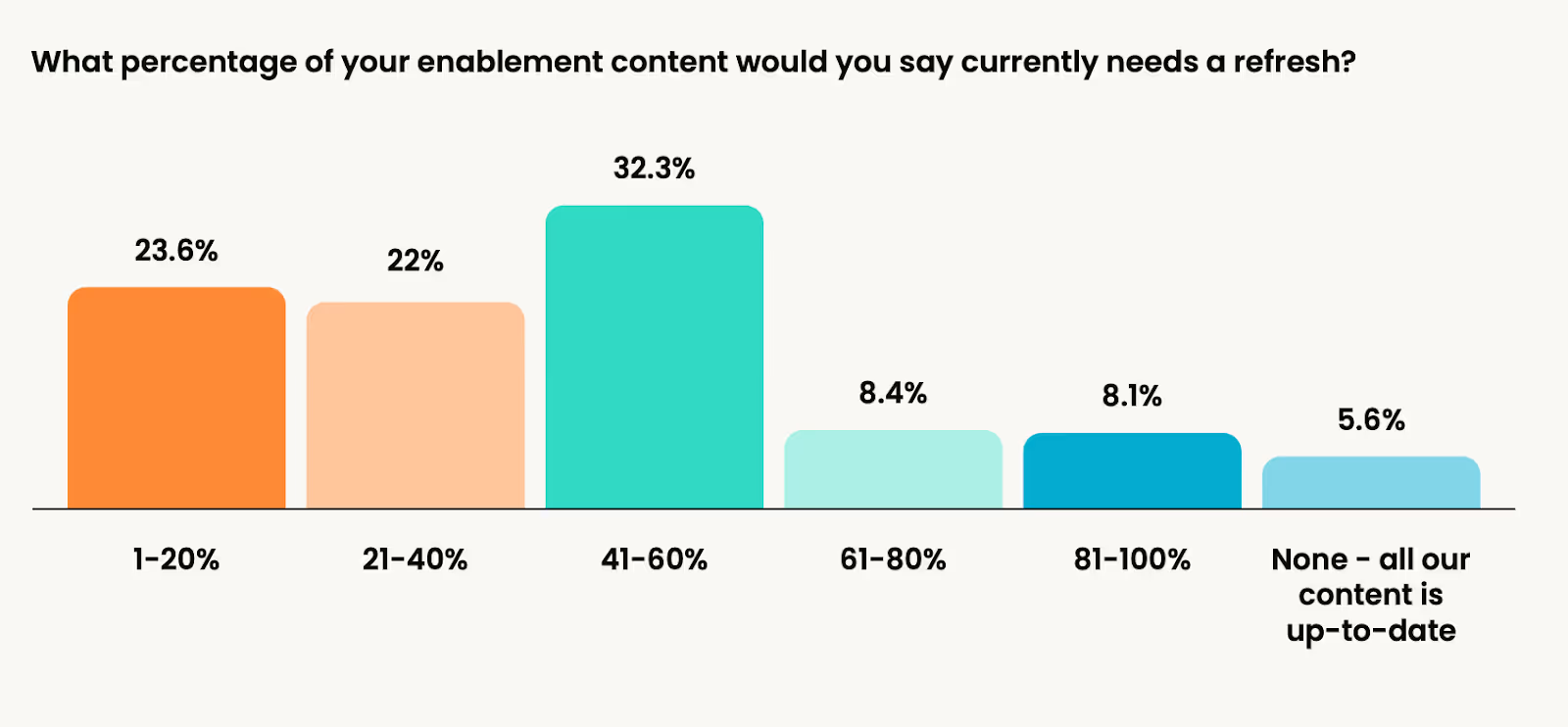
Take an inventory of your existing content. Then, identify which assets are still relevant and usable. Some may need a simple update, while others may need to be retired and replaced altogether.
4. Enable just-in-time learning
“Enablement only works if your reps actually use it,” says Melanie Fellay, CEO and co-founder of Spekit.
And the best way for your reps to use enablement content is when it’s delivered to them at their moment of need. So make it effortless for reps to find the right information with a just-in-time learning platform like Spekit.
Spekit turns insights into valuable learning opportunities—right in the tools your team is already using. How does this work?
Imagine a rep needs a refresher on the criteria to move an opportunity to Stage 2 of the sales cycle. Normally, they’d have to stop what they’re doing and go through some of the resources they received training to find the answer.
The problem here is that frequently jumping between apps can be “cognitively taxing” and make it harder for reps to refocus on their original task.
Just-in-time platforms deliver support and training at the moment of need rather than through traditional methods, so reps can stay in the flow of their work without disruptions.
Read more: What is Just-in-Time Training and When to Use It
5. Track enablement metrics
Sales enablement is a massive undertaking and there’s no point carrying on with ineffective resources or strategy. But to know what works and what doesn’t you need to measure.
Here are some sales enablement metrics to track:
- Ramp time
- Content usage rates
- Win rates
- Content adoption rates
- Cross-sell and Upsell Rates
- Customer feedback
- Rep satisfaction
Track these metrics to understand what resonates with prospects and prove the impact of your sales enablement efforts.
Spekit helps by automatically tracking how, when, and where reps use your enablement content. With built-in analytics, you can see which resources drive conversations forward, which ones sit unused, and where there are gaps in your strategy.
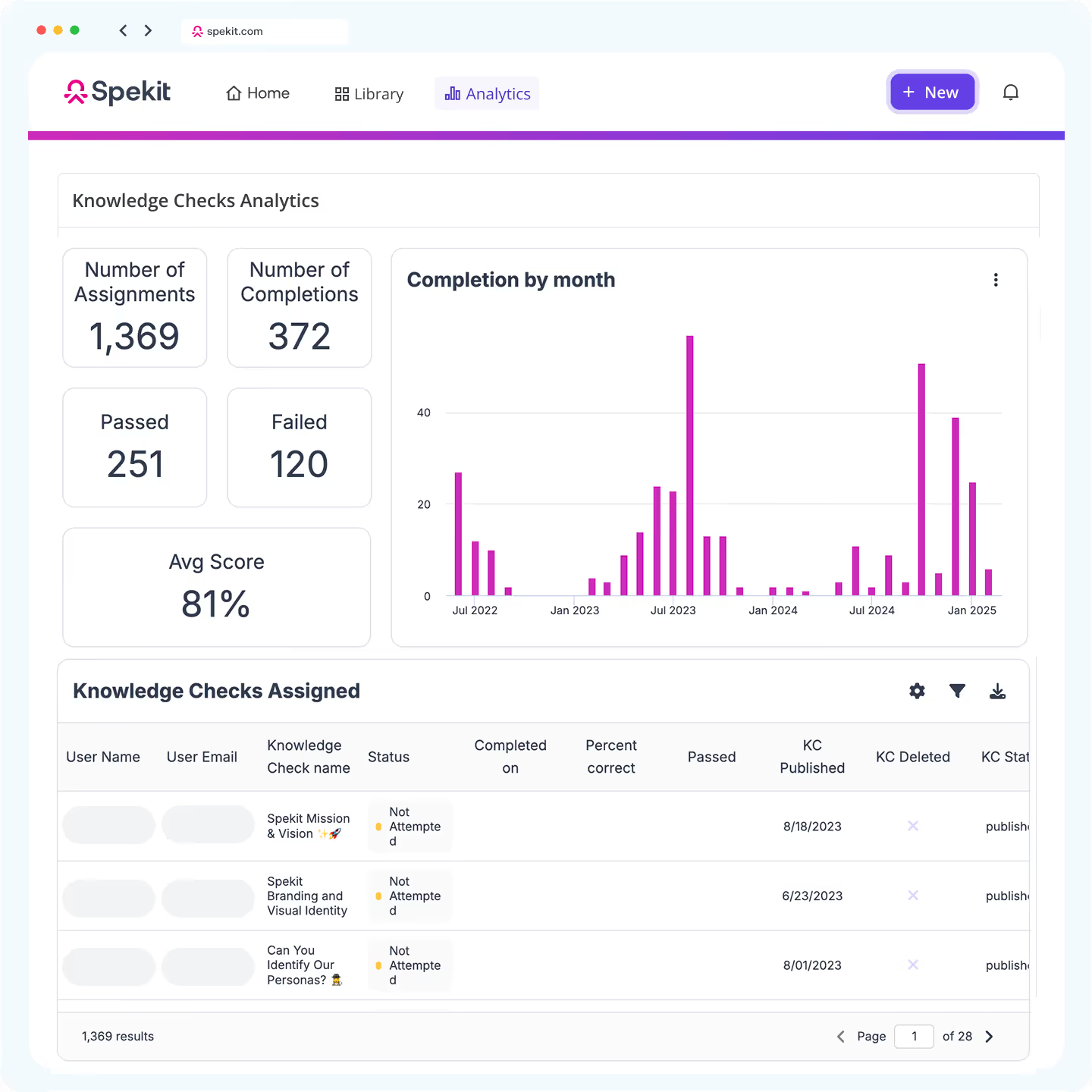
Real-time insights let you:
- Pinpoint high-performing content to replicate.
- Retire or update outdated resources before they hurt productivity.
- Measure adoption and engagement at the rep, team, or account level.
- Tie content and training directly to sales outcomes like win rates and deal size.
How to create sales enablement content that reps actually use
60% of enablement content goes unused. That’s wasted effort for the enablement team, frustration for sales reps who keep asking for help, and missed revenue opportunities.
So what does it take to create high-impact content? Should your sales enablement strategy already define that?
Yes, and no. Your strategy will highlight what your sales team needs but it doesn’t tell you what ‘good’ looks like or what to include at the creation stage.
Below are the best practices we follow to create sales enablement content our reps are excited to use because it helps them close deals.
Involve subject matter experts (SME)
SMEs provide deep product knowledge and insights that can add more depth to your resources, so it makes sense to leverage their expertise.
These experts include:
- Product experts: Look to these individuals for enablement content like comparison guides and feature deep-dives.
- Product marketing: Tap into your marketing team for messaging and positioning your products.
- Customer-facing roles: These individuals are invaluable resources for real-world examples of how actual users are solving their problems with your solution.
Pro tip: Involve reps in the content loop—create with them, not just for them. Get feedback from your reps to identify what’s working and what’s not and incorporate what you learn into enablement materials.
Prioritize clarity and usability
Enjoy searching through dense walls of text?
Neither do sales reps.
Always prioritize usability when creating sales enablement content.
That means:
- Designing for quick consumption: Make content easy to scan with relevant headings, bullet points, and embedded links.
- Prioritizing real-world applicability: Think FAQs, checklists, and talk tracks that address actual sales scenarios reps face.
- Using simple language: Avoid jargon or complex terminology that might affect comprehension.
Choose the right format for different types of information to increase retention. For example, text formats are best for quick reference materials like competitor battle cards, while videos are better suited for resources like product demonstrations.
Platforms like Spekit offer embedded guidance, which surfaces resources in real time everywhere they work in tools like Salesforce, Zendesk, and more.
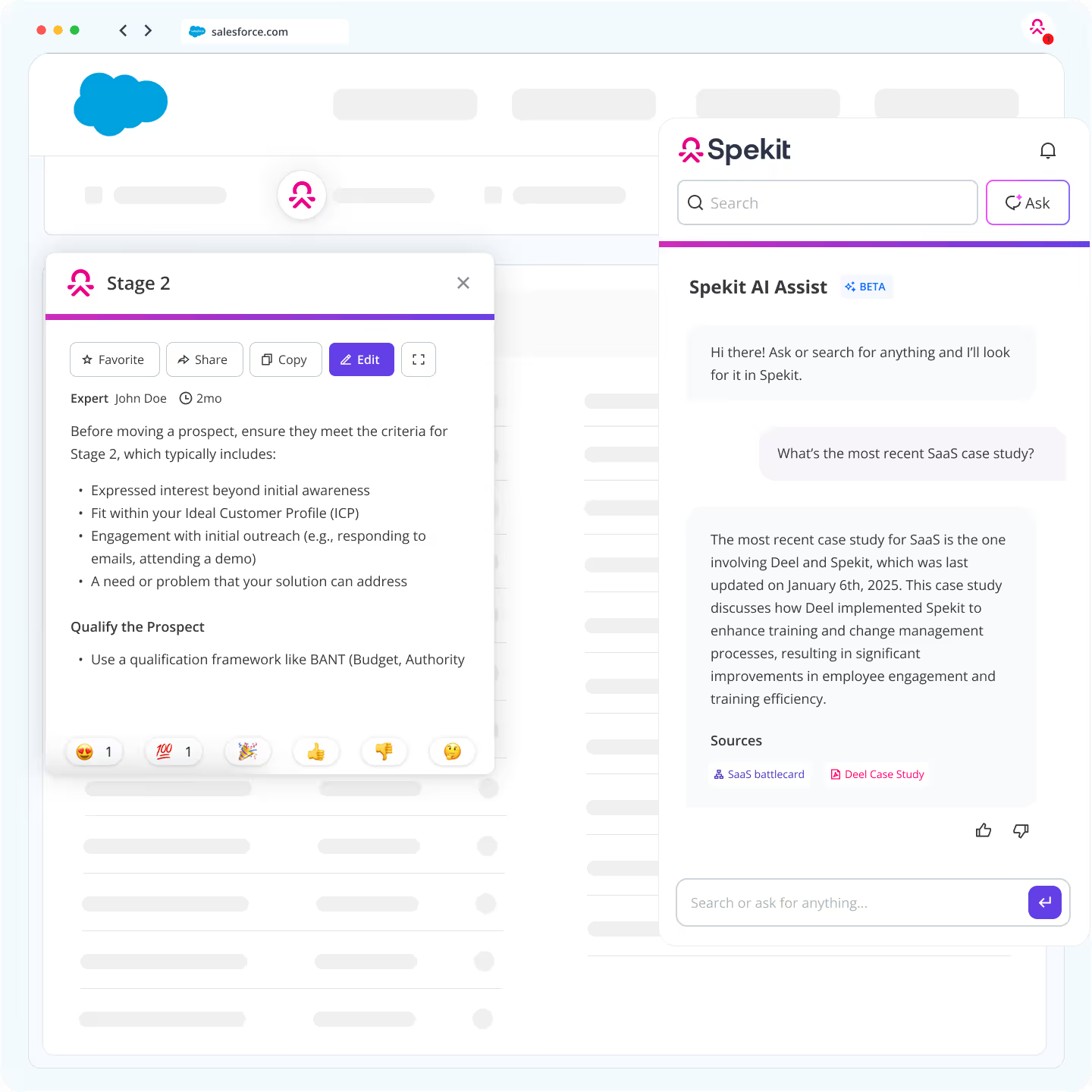
Pro tip: Get feedback from your sales team to understand which formats they use.
Refresh and iterate content based on usage data
If reps aren’t using resources, it’s worth asking why. Are the materials hard to find or difficult to use? Are they outdated? Are reps even aware these resources exist?
You can’t answer these questions unless you track content usage.
With Spekit, you can see how reps interact with your content and measure engagement. You’ll be able to determine what’s being used, shared, or ignored altogether.
Get feedback from reps and iterate your content. This keeps your content fresh and relevant.
Content creation example
The content creation process typically follows these steps:
- Information gathering: Interview top performers and document their strategies. Shadow sales calls to learn how professionals handle various scenarios. This is also when you’ll interview SMEs.
- Content planning: Before creating a piece of content, determine where in the sales process it’ll be used. Align content to specific moments in the rep journey (e.g., onboarding, objection handling, etc.).
- Content development: This is when you’ll transform raw information into sales-ready materials and “package” it for delivery. Prioritize clarity and structure content for scannability.
- Implementation: Drive content adoption through proper training and use the right tools. Walk through practical applications of new materials to ensure sales success.
- Monitoring: Not every content will succeed. Track enablement metrics and establish a feedback loop to continuously improve sales enablement content.
Creating effective content isn’t easy.
The good news is you don’t have to start from scratch.
Spekit AI streamlines content creation that allows you to:
- Turn a single sentence into revenue-generating playbooks
- Repurpose messaging for product launches into sales-ready assets
- Instantly summarize content into more consumable formats
Spekit AI Sidekick surfaces answers, playbooks, and resources right where reps work, so they can spend more time selling and less time toggling between tools.
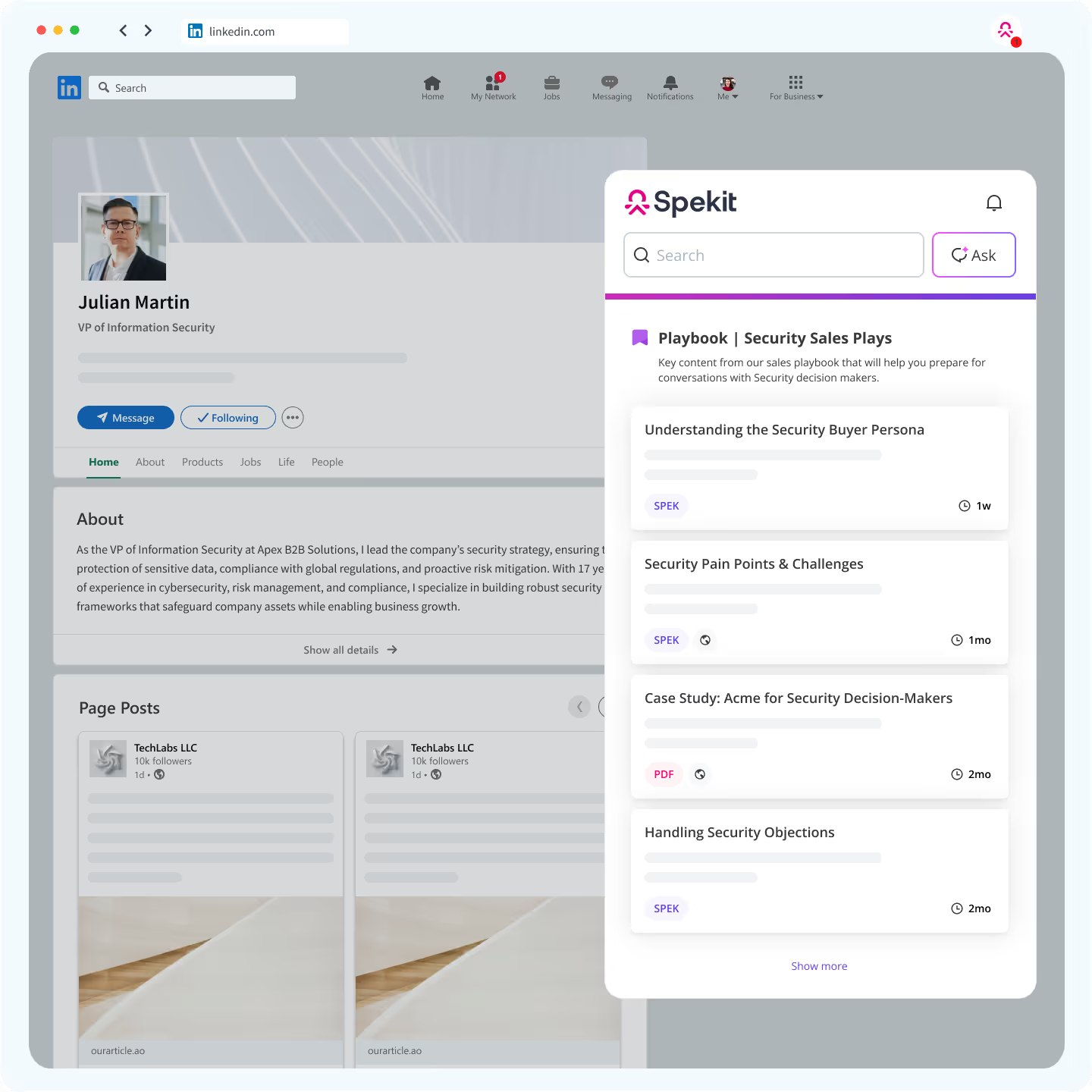
That’s not all.
Spekit AI can also turn dense documents into skimmable content. And you can instantly deliver alerts when content gets updated.
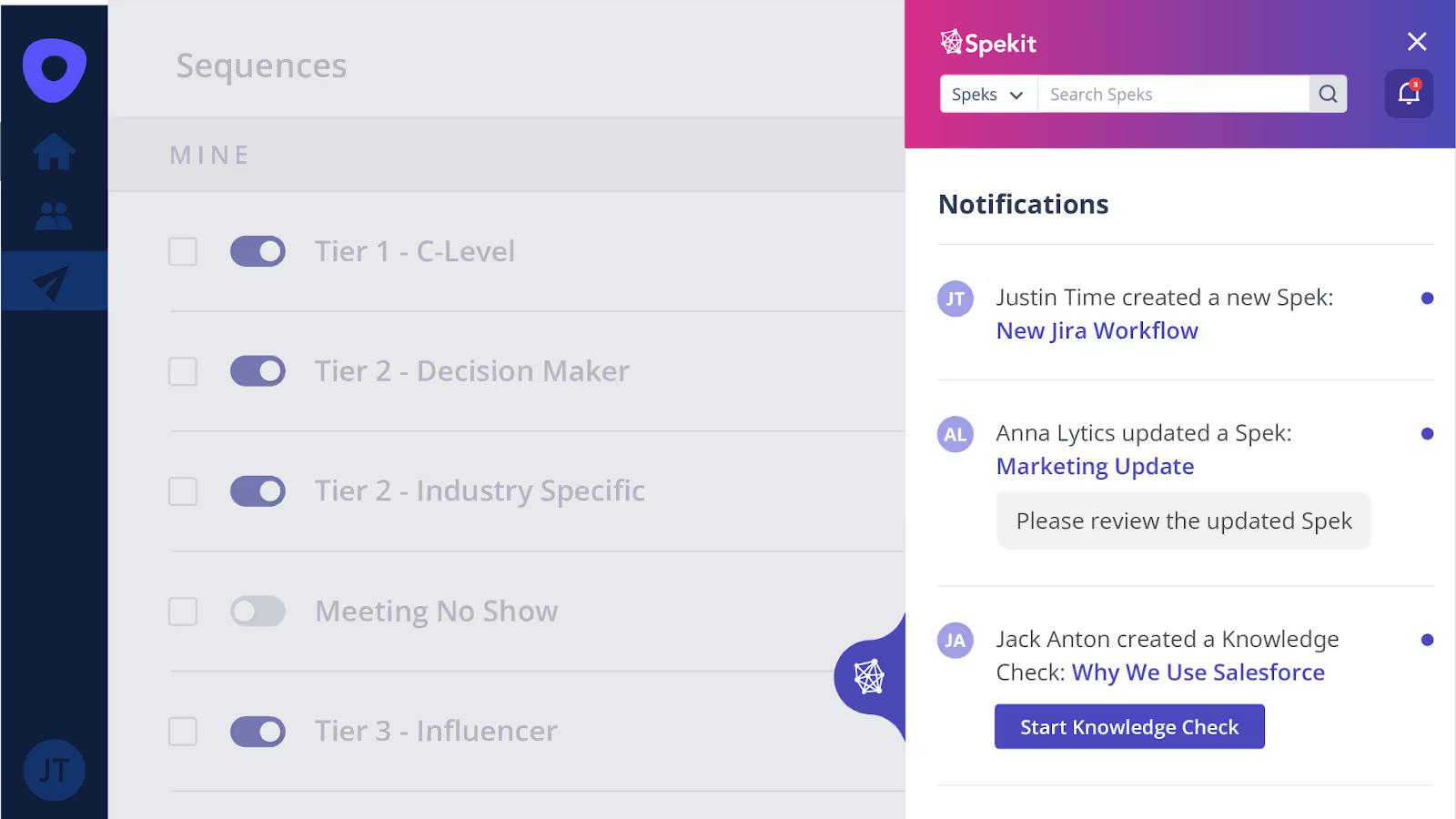
How to structure a sales enablement team for content success
Structure your team with the following roles:
- Sales enablement leader: Develops and oversees the entire sales enablement strategy, aligning efforts with sales objectives.
- Content development specialist: Creates and maintains resources like sales playbooks and training materials.
- Content operations specialist: Manages the content repository and ensures content is accessible to reps in their workflows.
- Sales technology manager: Implements various sales tools and technologies that are used by the sales team.
- Performance analyst: Analyzes the performance of sales enablement content and works with sales leaders to implement improvements.
Sales enablement teams don’t work in a vacuum. Cross-functional collaboration across departments is a must to keep things from falling through the cracks.
Working with a smaller, leaner sales enablement team? Or maybe there’s no dedicated team (yet) to support your enablement efforts?
Leverage AI sales enablement to support and scale enablement. For example, Spekit AI enables you to turn messaging docs into assets like battle cards in seconds, automate deduplication and governance to streamline content management, and much more.
Deliver just-in-time sales enablement content with Spekit
Creating sales enablement content and implementing a strategy is a great start. But what you really need is a platform that delivers resources to reps where they work, so they can focus on selling and close deals with confidence—without disrupting their workflows.
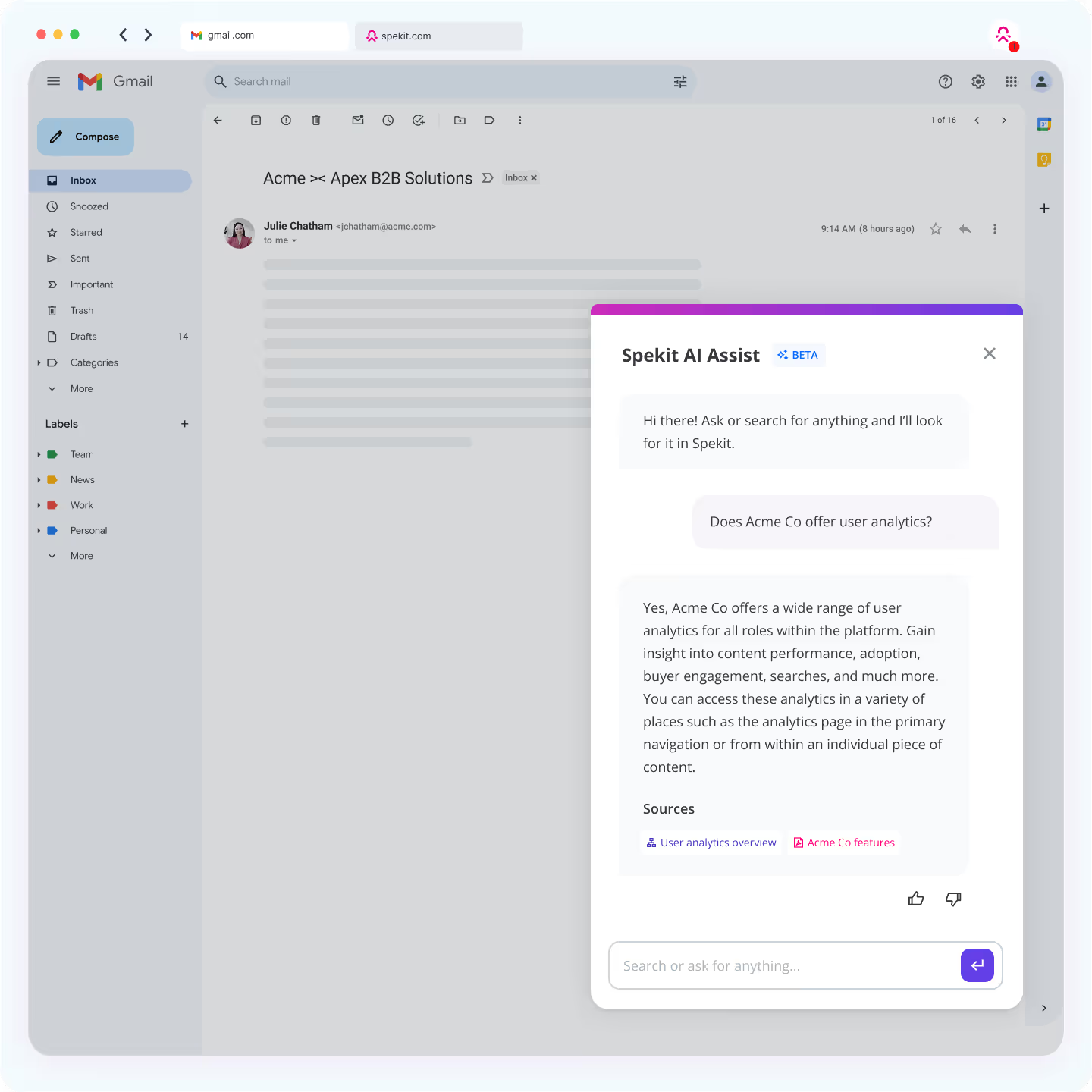
Spekit is the fastest path to creating and delivering high-impact, high-adoption enablement content that’s designed how sales teams actually work today. It also tracks usage and engagement, allowing you to refine your content based on real data.
Request a demo to implement just-in-time learning with Spekit.

